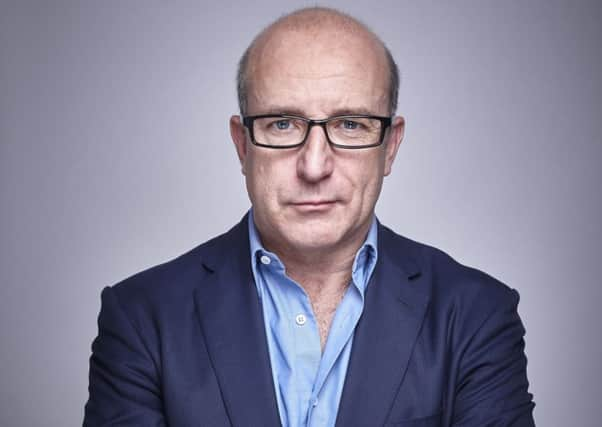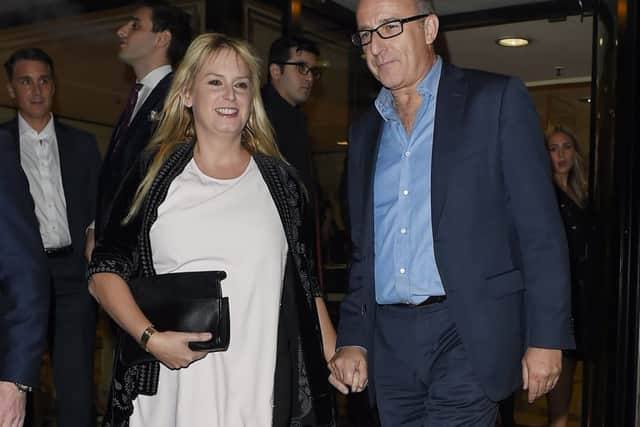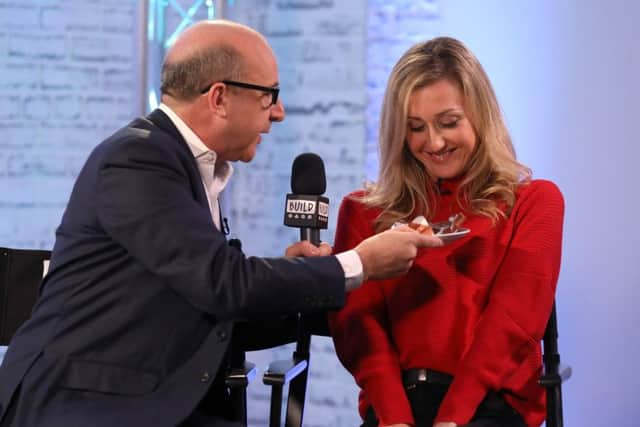Interview: Paul McKenna on taking control of sugar now


Tired? You could have fooled me. He talks 90 to the dozen down the phone, his voice persuasive and reassuring. OK, OK, I’ll never eat sugar again, (and this is before I’ve used his Craving Buster technique to link chocolate to chopped liver, hair from the floor of a hairdresser and a bucket of spit).
“No! It’s not about banning it completely,” he says. “It’s about reducing it, getting control and being able to take it or leave it.”
Advertisement
Hide AdOK, whatever you say. I’ve read the book and I’m convinced. Now, make me rich and happy.


But McKenna has only just got started on sugar, and is warming to his theme.
“This isn’t a quit sugar book, it’s a control it book. Because I like a glass of wine, my wife likes the occasional bit of chocolate, and sugar is around all of us. It’s about using techniques to reduce our consumption.
“This is a very different book from what I normally do. It’s not just self-help, it’s also a bit of an exposé of the sugar industry and why we’re in this mess where obesity, diabetes, liver disease and heart disease have all skyrocketed.”
According to McKenna, sugar is linked to these four of the top five causes of premature death, as well as being connected to depression, sleep problems and hypertension.


It’s highly addictive, tastes nice and many of us are hooked, using it to control our emotions.
Advertisement
Hide Ad“There are plenty of people who use chocolate or sugar in their tea to control their stress,” says McKenna.
“Everyone in the world controls their feelings by some external means – drinking, drug taking, gambling, shopping, sex, television, and the world’s drug of choice right now is sugar.
Advertisement
Hide Ad“I’m trying not to be too activist and sound like a radical, because it’s difficult not to have sugar in your diet and a certain amount is good for you, if you take it in fruit for example.


“But too much has long term health consequences.”
With one quarter of adults and a quarter of children in the UK overweight or obese, McKenna is not alone in blaming sugar, but it’s the sugar industry he really has it in for, not the weak-willed consumer.
“We should be mad at the industry who deliberately try and hide how much they’re putting in things, calling it 50 different names.
“They kept pointing in the direction of fat, and did a brilliant job muddying the waters, and it’s only because of the work of scientists who have stuck their necks out, and brilliant people like Jamie Oliver and Davina McCall, that we’re more aware.”


Now McKenna has joined the fray, so has he felt a backlash to his campaign?
“No. I’m waiting for them to take me on. Where is the sugar industry when you want a fight?” he says, sounding disappointed.
Advertisement
Hide Ad“I’ve been as contentious as I can and tried to provoke them.”
McKenna’s personal realisation that he was consuming far too much sugar came when he was working at the home of neuroscientist Dr Ronald Ruden, going through academic papers and starting to flag.
Advertisement
Hide Ad“I said ‘have you got any coffee Ronnie’, and he said ‘sure’, and I said, ‘oh and some sugar, and he said ‘We don’t have sugar in this apartment’ and gave me chapter and verse. I went away and looked at all kinds of academic research.
“It’s taken years to get to this stage.”
These days McKenna drinks his coffee without any sweetener and when his wife Kate buys smoked salmon, she reads the label.
“Why does smoked salmon contain sugar?” says McKenna. “People need to know.”
If anyone can push a message it’s McKenna, the multi-millionaire persuader from Enfield in London, who started out as a DJ.
After interviewing a hypnotist he taught himself the techniques and proceeded to make it big on TV.
His 1993 show The Hypnotic World of Paul McKenna was viewed in 42 countries by an audience of 200 million.
Advertisement
Hide Ad“There were lots of things I was rubbish at, but this was something I seemed to have an aptitude for,” he says.
“I had the most watched entertainment programme on television in 1993, but there came a point where I wasn’t enjoying it as much.
Advertisement
Hide Ad“I was doing little seminars for motivation and enjoyed that more.
“Also at the time, stage hypnotists came under criticism with people saying they’d been turned into a ballerina and still were, nonsense like that. “I don’t think there’s anything wrong with hypnotising somebody to be a kangaroo or dance like a ballerina, it’s no different to karaoke, and compared to I’m a Celebrity, what I was doing was pretty tame, but I realised I wouldn’t be taken seriously in behavioural science or self-help, or as an author if I continued doing those shows.
“My friend Simon Cowell made the observation that I could have a career in entertainment or move more into what I do now.”
So McKenna left TV hypnosis for self-help and behavioural science, using his techniques to help millions overcome phobias and compulsions with his Sky One show, I Can Change Your Life and I Can Make You Thin in 2005/6.
The book, I Can Make You Thin went on to become the biggest selling self-help book in British history and McKenna penned others to help us with everything from finding confidence and charisma, to quitting smoking, getting rich and being happy.
He even offered to make us a Tiger Woods on the golf course and help fix our broken hearts.
Advertisement
Hide AdSo successful are these titles, that McKenna is the country’s biggest-selling non-fiction author with 16 chart-topping self-help books.
Over the years celebrities have beaten a path to his door, from David Beckham to Courtney Love, Robbie Williams to Russell Brand. He helped Ellen deGeneres quit smoking and David Walliams in his bid to swim the English Channel.
Advertisement
Hide AdThe only time he admits to feeling starstruck was when he was contacted by David Bowie.
“That’s the only time I was overwhelmed. It was early on and I messed up the session.
“That wouldn’t happen now. Andybody could sit in front of me now.”
What did Bowie want?
“Well, it was over 20 years ago and Hanif Kureishi rang me and said David would like to meet you and I said David Bowie?
“That’s fantastic, let’s get together. He said what are you doing now and I said I’ll be there in 20 minutes.
“Bowie just oozed cool. It was surreal, like being in a movie. He was really polite, mannered, very intelligent and we had a nice rapport, but my mind wasn’t entirely focused and I didn’t have the psychological techniques that I have now to be able to shift him to what he wanted, unfortunately.”
What did he want?
Advertisement
Hide Ad“I can’t… do you know, even though he’s dead he was quite a private person so I haven’t really talked about it very much.
“I think it’s best, just out of respect to keep it private. But I will say he wasn’t like anyone else I’ve ever met. He didn’t think like anyone else.
Advertisement
Hide Ad“You know people joke about him being an alien, well there was something otherworldly about him.”
It’s not all slaying celebrities’ demons for McKenna, he treats war veterans for PTSD, runs corporate seminars, does radio and TV appearances and manages his own company too, Paul McKenna Training, founded in the mid 1990s with Richard Bandler, the co-founder of Neuro Linguistic Programming.
The appealing thing about McKenna, apart from his relentless enthusiasm, is his admission of his own fallibility.
He understands why people need a little help.
“Life’s overwhelming sometimes, you know. When my father died in 2011, I probably drank too much for a few weeks, because I was so sad.
“Other people take anti-depressants.
Personally I would recommend that people who are depressed or in an emotionally challenging place see a modern therapist: there’s hypnosis, NLP, and a bunch of psychosensory therapies like Havening, which we’ve just been working on with King’s College, London.”
Havening involves stroking the sides of your arms and moving eyes laterally from left to right to boost levels of the mood-stabilising brain chemical serotonin, to help banish trauma.
Advertisement
Hide Ad“Originally it was just war veterans, then we widened it to bereavement cases and rape victims. It works on seven in ten people, and it looks like a magic trick it works so fast.
“People go from feeling utterly traumatised to feeling fine,” he says.
Advertisement
Hide AdAt this point in the conversation a dog barks in the background of the London home he shares with his wife Kate Davey, formerly his PA of 20 years. It’s Misty, the two-year old Great Dane. Is having a dog one of McKenna’s ways of coping?
“Aw, Misty’s lovely. She’s quite a handful. Actually I‘ve got several ways of coping.
“When I’m feeling anxious I sit down and think where is that anxiety coming from? It’s usually trying to tell me something, say I’ve had an argument with a friend or need to prepare for something. Uncomfortable feelings have a purpose.
“Listen to that emotion, what’s it trying to tell me? Depression is actually an umbrella name for unacknowledged emotions that result from feeling overwhelmed.”
McKenna is also now happily married, which has contributed to his current peace of mind.
“A friend of mine said you date a lot of beautiful women but you don’t like them, and I said, well, they’re hot. And he said if you want a relationship ask yourself who do you love to be with and who do you feel connected to?
Advertisement
Hide Ad“That was Kate but to do anything about it would have been unprofessional. Then one night we were sharing a bottle of wine and I said ‘tell me something about you I don’t know’. And she said ‘I love you’. And I went ‘wow! I feel the same’. Now we’ve been together three and a half years and got married last year in Barbados.”
So where does McKenna’s desire to help people come from? At 53 he’s a multi-millionaire and it’s not like he needs the money. What’s his motivation?
Advertisement
Hide Ad“My primary objective was not to make money – I like doing it.
“I want every day to count. If you find something you love to do you never work again. I get interested in people’s problems, for my research, or a book and like solving them. It’s not entirely because I’m a nice person.
“I’m a bit of an ego maniac and I like being the best at something,” he says.
“What originally drew me to it was I went to a Catholic school where I saw a lot of cruelty that made me, I suppose, appreciate compassion. There’s that Chinese saying:
“If you want to be happy for an hour, take a nap, if you want to be happy for a week, take a holiday, if you want to be happy for a year, win the lottery, if you want to be happy for the rest of your life, help other people.”
When McKenna refers to his schooldays, he really lets rip for the first time in our conversation.
Advertisement
Hide AdSure he’s disgusted with the fat cats in the sugar business playing fast and loose with our health, but when he talks about the Jesuit college near his home in Enfield, his anger comes crackling down the line and he swears for the only time in our conversation.
“I can honestly say at school I learnt f***ing nothing! Nothing of worth!
Advertisement
Hide Ad“Everyone was beaten up by the teachers. The teachers were just vile bullies who wouldn’t survive in the real world.
“I wasn’t sexually abused but my best friend was. He confided in me and I didn’t know what to say.
“In the end they got the teacher and locked him up.
“You had to fend for yourself. My mum went and complained a few times, ‘I don’t think you should punch my son in the face like that’, or whatever the hell they did. But it was too late to move schools.
“Going to a Catholic school made me an atheist. I thought the last thing God would want to do would be to have anything to do with these paedophiles in the black dresses that kept beating the kids up.
“I’m still a recovering Catholic,” he says. Today he leans towards Zen Buddhism, and is a big fan of the Dalai Lama. “He says, kindness is my religion,“ says McKenna. “I live by that. I believe in good and evil, that there’s an intelligence and an organisation in our universe, a higher power if you like, but I don’t believe in the magic man in the sky. I pray each day, but I’m also an atheist.”
After 25 years of hypnotherapy, McKenna is in demand by corporations keen to motivate their employees, and has come across most problem behaviours.
Advertisement
Hide Ad“I don’t think there’s any psychological problem I can’t fix now,” he says. “That doesn’t mean I have a 100 per cent success rate. Someone might stop smoking, but six months on have a crisis and start again.
Does he never think oh just get on with yourselves, it’s too hard, you’ve worn me out?
Advertisement
Hide Ad“Oh God yes,” he says. “Sometimes disorders like obsessive compulsive disorder or eating disorders are hard. Someone with OCD will drive you crazy if you don’t protect yourself or you buy into their compulsive way of thinking. And if you’re really run down and you work with sick people who are depressed, you can get infected with their mindset. That happened to me a few years ago, so now I only work with people when I’m feeling strong.”
Staying strong means recovery periods, building in time with Kate and friends like Simon Cowell. McKenna recently decided to sell his LA mansion and the couple are planning to move out of London to somewhere more rural.
“Now I’m married and I’m liking the quieter life. I’m probably going to retire in about three years. I like the idea of a log fire, a comfy couch.... somewhere in the country with a bit of land.” His voice has become dreamy, hypnotic. “More dogs, horses...”
Then with a snap, we’re back in the present. “Got to go! Time for the photoshoot, bye, thank you, bye, bye,” and he’s gone. Off to battle the sugar industry and help the sweet-toothed masses beat their bad habits and neuroses. It’s time to Get Control of Sugar. Now!
@JanetChristie2
Get Control of Sugar Now! by Paul McKenna is published by Penguin, £12.99. www.penguin.co.uk, www.paul mckenna books.co.uk; www.havening.org